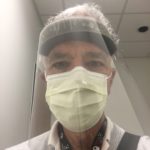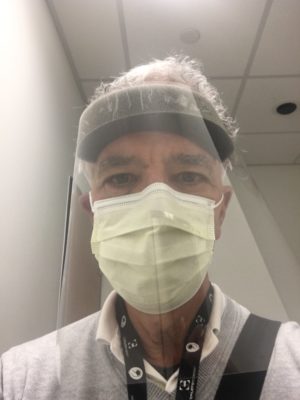Covid-19: Opinion Piece
 Dr Paul Ranalli in PPE gear.
Dr Paul Ranalli in PPE gear.
Did we sign up for this? Well, yes, we did, when we entered medical school and took the Hippocratic Oath.
Maybe we didn’t envision this exactly, but deep down we knew it was possible.
We are fighting a type of war with the Coronavirus, and while we are professionals, we are civilians, and perhaps not steeled by the basic training of soldiers. We have the same anxieties as anyone else, and no amount of personal protective equipment can fully allay them. And for colleagues under far greater duress – in New York, in northern Italy, in Spain – the fear is that much greater when the supplies of protective equipment are limited.
But whatever degree of personal resolve we might each harbour, it is strengthened immeasurably by the motivation of seeing our colleagues in the front lines. And it is not just the sight of fellow doctors, nurses, and respiratory technicians carefully suit up and wade into a sealed emergency room or intensive care unit suite. We are also motivated by the knowledge that the cleaners and porters take on a similar risk. We are motivated by the knowledge that a nurse with young children at home cannot hug them for fear of transmitting the virus, yet she suits up and goes back to work the next day anyway, and the next, and the one after that.
For myself, I recently completed 14 consecutive days of neurology consultation and treatment service at my home hospital, Humber River. Throughout that time, and for another 14 days afterward (which I am still in), my hospital clothes and shoes are left in the garage. I cannot hug my wife. My young adult son has moved out for the time being, as he fears the possibility of transmitting the virus to his girlfriend’s father, who is older, and has pre-existing conditions that would portend a poor prognosis should he ever become sick.
Yet I am reassured that this too shall pass. We hospital workers were already familiar with donning PPE before seeing any patient over the past few years admitted with an undiagnosed fever and respiratory illness. This has been a standard hospital precaution since the Toronto SARS experience. That SARS coronavirus was more deadly then COVID-19, though not as infectious, and largely confined to acute care hospitals, and so has more easily passed from public consciousness. Fortunately that virus mutated into a more harmless form, and is no longer an issue. We can hold out hope that the same might happen with this new virus, or we will become protected by an effective vaccine, and that some day in the future we will have a similar hard time remembering much about the pandemic, and dealing with the virus will settle into a routine.
Until then, we are inspired by our fellow health care workers in the hospital, and around the world. One of my colleagues shared the words of a Spanish thoracic surgeon he heard on Skype, something to the effect that, in the face of grinding fatigue, and fear of the unknown, we must demonstrate solidarity and generosity to our patients, and our colleagues, at this time. These words call to my mind the courage and generosity of spirit of our Institute’s founder, Dr. Barrie de Veber.
I have no doubt how he would have unreservedly thrown himself into the health challenge we face today.
Dr. Ranalli is a Toronto neurologist, in active clinical practice at the Humber River Hospital and the University Health Network. He is a Lecturer in the Departments of Medicine (Neurology), Otolaryngology, and Ophthalmology & Visual Sciences at the University of Toronto.
Dr Ranalli is the author of numerous peer-reviewed articles as well as several book chapters on human neurophysiology.


